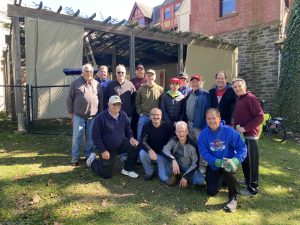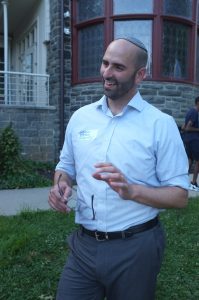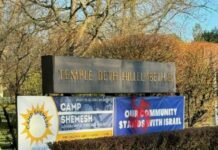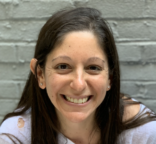
Rabbi Marshall Maltzman served as the spiritual leader of Temple Beth Hillel-Beth El in Wynnewood from 1961 to 1991. Then Rabbi Neil Cooper served in the same role from ’91 until this summer.
So when Rabbi Ethan Witkovsky replaced Cooper in June, he became just the third spiritual leader in the congregation’s 61-year history. That’s a moment worth celebrating, according to temple leaders. And over the weekend of Nov. 11, they will.
Witkovsky’s “installation weekend” will be a moment of communal “dedication,” he said. The synagogue’s 700-plus households are invited to observe the new leader “become installed” on Sunday in the sanctuary.
In addition to the ceremony, the weekend will include a Shabbat service on Friday night with a dinner and two talks — one by Arnold Eisen, the former chancellor of the Jewish Theological Seminary, and another by Rabbi Elliot J. Cosgrove, the senior rabbi at Park Avenue Synagogue in New York City, where Witkovsky worked for the past eight years.
“It’s less about me and more about the community,” Witkovsky said. “It’s giving us a good reason to have everyone come out.”
After two-plus years of COVID, restrictions and Zoom services, it’s also a way of “reminding everybody that we’re here,” he added.
“We want to get everyone excited about the strength and how good the community really is,” he said. “And then we’re going to set up where things are going to go in the future.”
Temple Beth Hillel-Beth El President Barbara Bookman explained that the installation weekend will emphasize the synagogue’s “shared history” and “future.” And there is no future without funding. That is why, in addition to the festivities, the weekend will serve as a launching point for a “seeds campaign.”
As Bookman put it, the Main Line temple is going to raise money and plant trees.
“Our seeds campaign is planting the roots for our future where we can flourish and grow,” she added. “It’s a campaign that will help with financial stability for the future of our congregation.”
“We’re looking to grow in a lot of wonderful ways with Rabbi Witkovsky,” Bookman said.
Synagogue leaders do not have a specific number in mind. The new rabbi said “the sky’s the limit,” and the president, a member of 39 years, added, “It’s all good.”
Once they start raising money, Witkovsky, Bookman and other leaders hope to continue the momentum toward a strategic plan process. Bookman said that members have known that a new plan was necessary, but they wanted to wait until they hired a new rabbi.
Now though, the process should begin this winter. To start, synagogue officials will gather a group of congregants into a committee to lead the process. Then it will hold general meetings and meetings with “different constituency groups,” as Bookman described them, to discuss issues and brainstorm ideas.
“Talk about what we think is needed,” Bookman said.

Temple Beth Hillel-Beth El had about 600 households when Cooper took over in 1991. By the time he announced his retirement in August 2021, that number had grown to 700.
Today it’s even higher, according to Bookman and Witkovsky. The rabbi also mentioned that there’s a “relatively even split of young families, families with high school- and school-aged kids and whatever the right names are for the generations above that.”
The temple’s Early Childhood Center has 133 students, and Witkovsky described it as “bursting at the seams.” Religious school enrollment is 160 students, the highest number in four or five years, he said.
Anecdotally, the synagogue also has “a lot of people who are volunteering and coming out,” Bookman said.
“It is growing a lot,” Witkovsky said. “We’re very excited, and we need to plan for the future in an intentional way.”
Those intentions, though, are not yet clear. Right now, Temple Beth Hillel-Beth El has a plan to make a plan, but that’s really it.
Bookman and Witkovsky identified no major issues that the synagogue needs to address. They believe that core focus areas will emerge from the conversations they have with members during the planning process.
As Bookman said at the time of Cooper’s retirement announcement, “We have a thriving synagogue in a difficult time for Conservative synagogues.” But the time is nonetheless difficult, so maybe that’s the challenge. In the hybrid service era, with the less religious generations of millennials and Gen Zers in their primes, how can a synagogue convince people to come out?
“People are looking for a community that cares about them,” Witkovsky said after his hiring in February. JE






